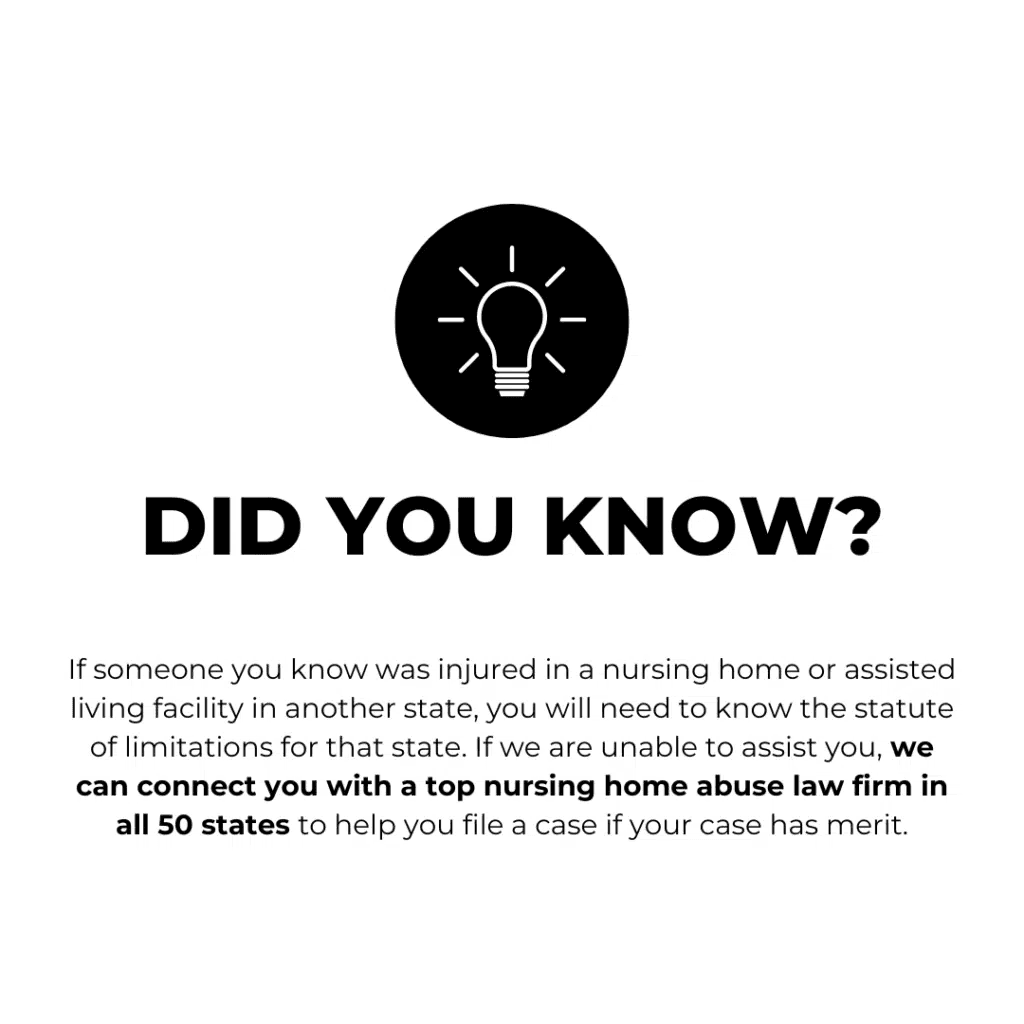
Nursing home abuse and neglect put vulnerable residents at serious risk, leading to malnutrition, dehydration, infections, and preventable injuries. When facilities fail to provide adequate care, residents suffer, and families are left feeling helpless. Lack of supervision, improper medical treatment, and unsafe conditions can result in devastating harm. Understanding the warning signs, knowing your legal rights, and holding negligent facilities accountable are crucial steps in protecting your loved ones. Learn how to take action and seek justice.
November 5, 2024
3 min
Every year, we honor veterans on special occasions like Veterans Day and Memorial Day. Still, it’s essential to remember that these men and women need support year-round, primarily when they reside in nursing homes. Veterans who have served our country often face unique challenges as they age, from healthcare needs related to their service to mental health support for conditions like PTSD. Unfortunately, many veterans continue to feel the physical and emotional effects of their military service well into their later years.
Today, there are approximately 9 million veterans over the age of 65 in the United States, making up a significant portion of our elderly population. Of these, many reside in nursing homes or assisted living facilities, often due to complex health needs. The U.S. Department of Veterans Affairs (VA) reports that roughly 23% of veterans aged 85 and older live in nursing homes or other long-term care settings. This is nearly double the rate for non-veterans in the same age group, reflecting both the sacrifices they made during their service and the lasting impact those experiences can have on their health.
Ensuring that veterans in nursing homes receive quality care and respect is a way to honor their sacrifices and provide them with the dignity they deserve in their later years. Here are several ways we can support veterans in nursing homes and recognize the unique contributions they have made.
Veterans often face specific health challenges related to their service, such as injuries, hearing loss, mobility limitations, and chronic pain. Many may also have health issues that developed due to exposure to hazardous environments or substances while in the military. Nursing homes caring for veterans should be equipped to address these needs effectively. This includes having trained staff who understand how to care for veterans with service-related injuries or conditions and partnerships with healthcare providers specializing in veterans’ care. Ensuring veterans receive appropriate screenings, treatments, and therapies tailored to their unique situations is crucial for improving their quality of life.
Families and caregivers need to be proactive in discussing their loved ones’ military history with nursing home staff. This background can inform the type of care veterans receive, from pain management strategies to rehabilitation services that cater to their specific conditions. Nursing homes can foster a more personalized and practical approach to care by creating an environment that acknowledges and respects their past.
Mental health issues such as PTSD, anxiety, and depression can be prevalent among veterans, especially those who have experienced combat or traumatic events. When these veterans move into nursing homes, they may feel isolated or disconnected from those who understand their experiences. Providing access to therapy, mental health support, and peer counseling can significantly impact a veteran’s mental health and overall well-being. Establishing a supportive community where veterans can share their struggles and successes can help break the stigma surrounding mental health issues and promote healing.
In addition to professional therapy, nursing homes can create supportive spaces for informal discussions among veterans, where they can share stories, coping strategies, and encouragement. This camaraderie can foster a sense of belonging and understanding that is vital for veterans adjusting to life in a care facility. Activities that promote mental well-being, such as art therapy or group exercise classes, can also be integrated into the daily routines of nursing homes to enhance veterans’ emotional health.
Veterans often feel a strong connection to those who have had similar experiences, and fostering this community within nursing homes is essential for their emotional health. Organizing regular gatherings, events, or discussion groups where veterans can socialize, reminisce, and connect with others who share their backgrounds can create a sense of camaraderie and support. These gatherings allow veterans to bond over shared experiences, celebrate their service, and discuss the challenges they face as they age.
Nursing homes can also celebrate significant dates, such as Veterans Day, by hosting special events that honor veterans and their service. Whether through guest speakers, ceremonies, or themed activities, creating opportunities for veterans to come together fosters friendships and provides them with a support network. Engaging in recreational activities tailored to veterans, such as military-themed games or movie nights featuring films about their experiences, can further enhance their sense of community and belonging.
Recognizing veterans for their service is a powerful way to honor them and show appreciation for their sacrifices. Nursing homes can commemorate Veterans Day, Memorial Day, and other significant dates with ceremonies or events that unite the community. These events can include speeches, playing taps, or the presentation of colors by local veterans’ organizations. Displaying photos or memorabilia from their time in service, if the veterans are comfortable with it, can also be a meaningful way to show respect and pride in their contributions.
Celebrating their service not only boosts veterans’ morale but also educates staff and other residents about the significance of their sacrifices. By fostering an environment of appreciation and respect, nursing homes can enhance the dignity and honor that veterans deserve, making them feel valued and recognized within the community. Honoring veterans can create a ripple effect, encouraging others to reflect on the importance of service and sacrifice, thus strengthening the overall culture of respect within the facility.
Many veterans are entitled to benefits through the Department of Veterans Affairs, including healthcare, financial support, and services tailored for elder care. However, navigating VA benefits can be complex, and some veterans may not be aware of the full range of services available to them. Ensuring that nursing homes assist veterans in accessing these benefits is crucial for their well-being and quality of life. This can include information about pensions’ eligibility, long-term care benefits, and healthcare options specifically designed for veterans.
Nursing homes that have established relationships with VA representatives can facilitate the application process and help veterans understand their entitlements. Providing educational resources about VA services and how to apply for them can empower veterans and their families to take advantage of their support. Additionally, staff can be trained to assist with this process, ensuring that veterans are not left to navigate it alone.
Social isolation can be a significant issue for veterans, particularly those who may not have close family nearby. Many veterans have lived solitary lives after their service and may feel uncomfortable reaching out for help or companionship. Nursing homes can help by arranging activities, outings, and opportunities for veterans to stay engaged and active within the community. Implementing various social programs, from game nights to art classes, can encourage participation and help veterans build connections with others.
Creating intergenerational programs that connect veterans with younger community members can also provide meaningful relationships and opportunities for sharing experiences. These interactions can foster mutual understanding and respect, helping bridge the gap between generations while enriching the lives of veterans and younger participants. Regular check-ins from staff or volunteers can further alleviate feelings of loneliness and ensure that veterans are included in the social fabric of the nursing home.
It’s important to ensure that veterans in nursing homes receive the same high level of care as other residents and the additional respect their service deserves. Veterans often have specific expectations for the care they receive, shaped by their experiences in the military. This can include a desire for clear communication, respect for their autonomy, and a structured approach to care. Nursing homes should strive to meet these expectations by creating individualized care plans that consider veterans’ backgrounds and preferences.
Training staff to understand the military culture and the unique needs of veterans can enhance the quality of care provided. This understanding fosters an environment where veterans feel safe, respected, and valued. Involving veterans in their care decisions and respecting their choices can help maintain their dignity and provide control over their lives, which is especially important for those who may have experienced a significant loss of autonomy in a nursing home setting.
Visits from veterans’ organizations, community groups, or local schools can bring joy to veterans in nursing homes and create connections with the outside community. These visits allow veterans to share their stories, feel appreciated, and engage with individuals who honor their service. Local schools or youth organizations may be particularly eager to participate in programs that allow students to learn from veterans while providing companionship and friendship.
Facilitating regular visits and events with veterans’ groups can enhance the overall atmosphere of the nursing home, promoting a sense of community and appreciation. Involving the broader community in supporting veterans can reinforce the importance of honoring those who served while also encouraging a culture of respect and gratitude within the facility. These interactions can foster relationships that transcend the walls of the nursing home, ultimately enriching the lives of veterans and community members.
Supporting veterans in nursing homes is a way to honor their service and ensure they receive the dignity, respect, and care they deserve. Family members, caregivers, and communities can all play a role in improving the quality of life for these veterans. Understanding their unique needs, fostering supportive environments, and facilitating access to resources can create a nurturing atmosphere where veterans feel valued, safe, and celebrated in their golden years.
For families, actively monitoring care quality and advocating for their loved ones is essential. When we support veterans in nursing homes, we not only help those individuals—we uphold a national commitment to honor those who served, ensuring that they continue to receive the care and respect they have earned throughout their lives.

Michael Hill is a nationally recognized attorney who handles exclusively cases against long term care facilities. Michael and his firm, Michael Hill Trial Law, are headquartered in Cleveland, Ohio but handle cases across the country.
Disclaimer: This information is provided for informational purposes only. Nothing in this article should be construed as providing legal advice or the creation of an attorney client relationship. Laws are updated frequently and change from state to state. If you desire legal advice, you can contact Michael Hill Trial Law at www.protectseniors.com, send an email to info@protectseniors.com, call (800) 659-2712 to begin an investigation, or contact another attorney.